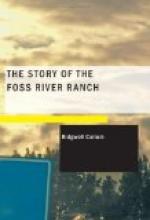Despite the fact that his horse had been under the saddle for nearly eight hours Horrocks rode at a great pace. He was one of those men who are always to be found on the prairie—thorough horsemen. Men who, in times of leisure, care more for their horses than they do for themselves; men who regard their horses as they would a comrade, but who, when it becomes a necessity to work or travel, demand every effort the animal can make by way of return for the care which has been lavished upon it. Such men generally find themselves well repaid. A horse is something more than a creature with four legs, one at each corner, head out of one end, tail out of the other. There is an old saying in the West to the effect that a thorough horseman is worthy of man’s esteem. The opinion amongst prairie men is that a man who loves his horse can never be wholly bad. And possibly we can accept this decision upon the subject without question, for their experience in men, especially in “bad men,” is wide and varied.
Horrocks avoided the settlement, leaving it well to the west, and turned his willing beast in the direction of the half-breed camp. There was an ex-Government scout living in this camp whom he knew; a man who was willing to sell to his late employers any information he chanced to possess. It was the officer’s intention to see this man and purchase all he had to sell, if it happened to be worth buying. Hence his visit to the camp.
The evening shadows were fast lengthening when he espied in the distance the squalid shacks and dilapidated teepees of the Breeds. There was a large colony of those wanderers of the West gathered together in the Foss River camp. We have said that these places are hot-beds of crime, a curse to the country; but that description scarcely conveys the wretched poverty and filthiness of these motley gatherings. From a slight rising ground Horrocks looked down on what might have, at first sight, been taken for a small village. A scattering of small tumbled-down shacks, about fifty in number, set out on the fresh green of the prairie, created the first blot of uncleanly, uncouth habitation upon the view. Add to these a proportionate number of ragged tents and teepees, a crowd of unwashed, and, for the most part, undressed children, a hundred fierce and half-starved dogs of the “husky” type. Imagine a stench of dung fire cooking, and the gathering of millions of mosquitoes about a few choyeuses and fat cattle grazing near by, and the picture as it first presents itself is complete.
The approach to such a place makes one almost wish the undulating prairie was not quite so fair a picture, for the contrast with man’s filthy squalor is so great that the feeling of nauseation which results is almost overpowering. Horrocks, however, was used to such scenes. His duty often took him into worse Breed camps than this. He treated such places to a perfectly callous indifference, and regarded them merely as necessary evils.




